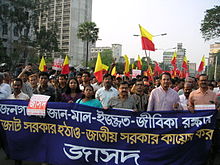Jatiya Samajtantrik Dal
The Jatiya Samajtantrik Dal ( JSD , Bengali জাতীয় সমাজতান্ত্রিক দল , "National Socialist Party"), often abbreviated acronym Jasad or JaSoD ( Bengali 'জাসদ' ) is a party of the left socialist spectrum in Bangladesh .
Party history

The JSD was founded in 1972, shortly after Bangladesh gained independence, by disappointed former supporters of the Awami League . These former Awami Party-goers had the independence of Bangladesh from Pakistan in the war of independence in 1971 want to fight alone. They saw the military intervention of India on the side of Bangladesh with the invasion of Indian army units in what was then East Pakistan as an attempt to suppress the emergence of a socialist society in Bangladesh. Accordingly, the JSD supporters were dissatisfied with the policies of the first Bangladeshi Prime Minister Mujibur Rahman (Awami League), called for a socialist transformation of society and, in some cases, fought the government of the Awami League with violent means.
Mujibur Rahman's attempt to introduce a kind of presidential dictatorship and one-party regime in 1975 in view of the increasing economic problems failed and he was overthrown and murdered in a coup that same year . After that, the JSD gained some political influence under the subsequent military regime. In the 1980s, however, the party split up into various sectarian groups that pursued different political goals and, above all, adopted different attitudes towards General Ershad 's military regime . As a result, it lost political weight. One of these factions, which was led by ASM Abdur Rab ( JSD (Rab) ), essentially supported the measures of the military government and thus came very close to the Jatiya Party in its political content . Another parliamentary group, led by Shajahar Siraj ( JSD (Siraj) ), did not participate in the boycott of the 1986 general election , but always voted against the government's proposals in parliament. A third faction, led by Hasan Huq Inu ( JSD (Inu) ), refused to cooperate with the government and joined the extra-parliamentary opposition with other left-wing political groups. After the end of Ershad's presidency, the JSD and its various factions belonged to the small parties and won a maximum of 1–2 seats in the parliamentary elections. In the parliamentary elections in 2008 , 2014 and 2018 , the JSD entered into an electoral alliance with the Awami League as part of the so-called "Great Alliance" and won 3, 5 and 2, respectively, out of 300 constituencies.
Individual evidence
- ↑ a b Interview with Mushtuq Husain: the struggle in Bangladesh. International Socialism - A quarterly review of socialist theory, accessed February 1, 2016 (History of the JSD from the perspective of one of its party leaders).
- ↑ Leftist Parties. countrystudies.us/bangladesh, accessed February 1, 2016 .
